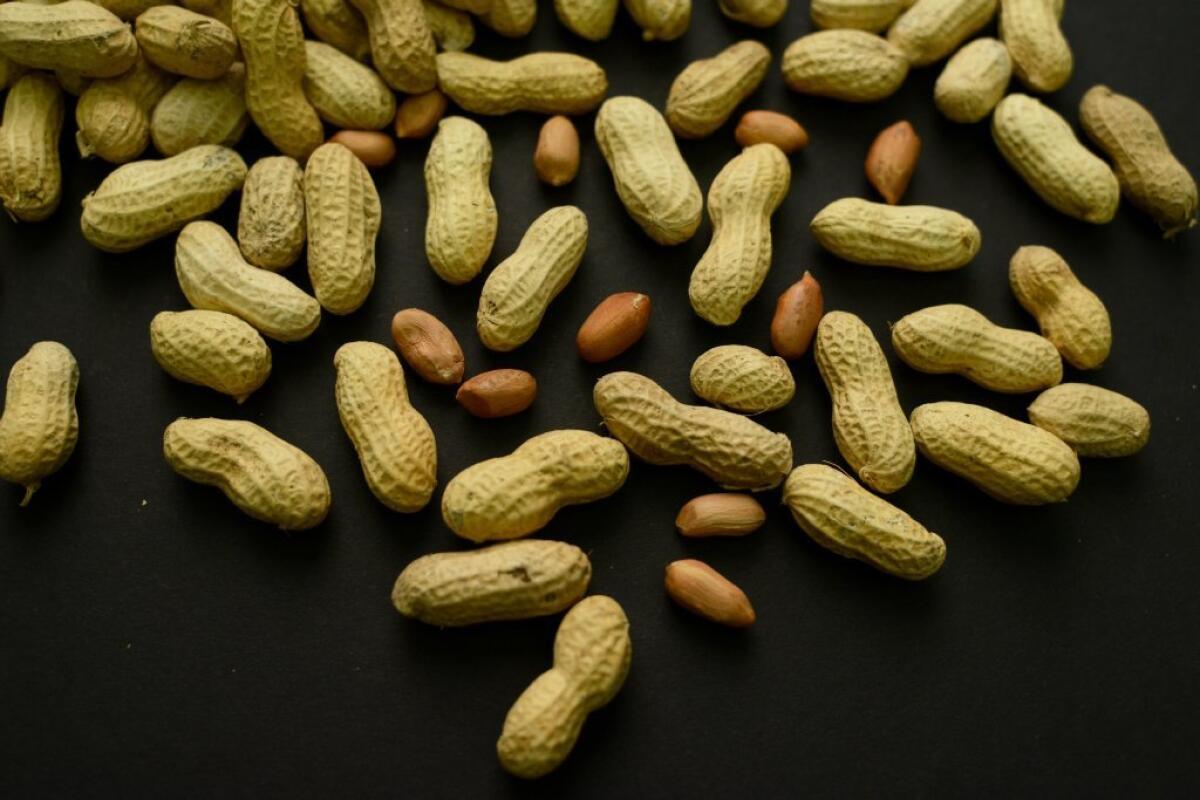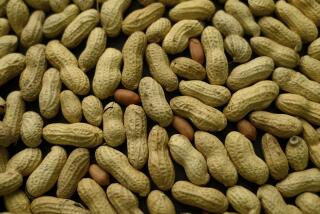A nutty weapon to fight peanut allergy

- Share via
It seemed like a good idea at the time: With the incidence of peanut allergy climbing among children, the American Academy of Pediatrics advised parents in 2000 to keep peanuts far away from infants and toddlers who might have a life-threatening reaction to them.
But a new study suggests that advice did more harm than good.
A long-awaited clinical trial has found that small children who avoided peanuts for the first five years of their lives were up to seven times more likely to wind up with a peanut allergy than kids who ate peanuts at least three times a week.
The findings were presented Monday at the annual meeting of the American Academy of Allergy, Asthma and Immunology and published online by the New England Journal of Medicine.
“The results have the potential to transform how we approach food allergy prevention,” Dr. Anthony Fauci, director of the National Institute of Allergy and Infectious Diseases, said in a statement. The institute helped fund the study.
The trial results offer fresh support for the so-called hygiene hypothesis, which ties the rise in allergies and autoimmune disorders to the ultra-sterile environment made possible by antibacterial soap, disinfectants and other cleansers that have become staples of modern life.
Indeed, a study published Monday in the journal Pediatrics found that children whose families used dishwashing machines were more likely to have allergies than kids whose plates were washed by hand.
All of this unnatural cleanliness robs the immune system of the opportunity to develop resistance to germs and other substances that humans used to encounter on a regular basis.
The result is less immune tolerance — and more allergies. About 3% of children in developed countries are now allergic to peanuts, the study authors say. The rate in the U.S. has tripled over less than two decades, according to figures from the U.S. Centers for Disease Control and Prevention.
Although allergies to eggs and cows’ milk are more common, peanut allergies are the most likely to be life-threatening and generally persist for a lifetime.
The alarming rise of peanut allergies has led to the banning of peanuts from schools, airlines and other venues.
Anecdotal evidence for the hygiene hypothesis came from a 2008 study of Jewish children. Some lived in Britain, where toddlers don’t eat peanuts until they are at least a year old. The others lived in Israel, where infants start eating foods made with peanuts when they are 7 months old.
Although both groups of children had a “similar genetic background,” the British children were 10 times more likely to have peanut allergies than their counterparts in Israel.
Some of the doctors and allergy experts who worked on that study set out to test the hygiene hypothesis.
They enrolled 640 infants in the Learning Early about Peanut Allergy trial — nicknamed LEAP. All the infants were deemed to be at risk of developing peanut allergies because they were already allergic to eggs or had severe eczema, a skin condition that can be caused by allergies.
All the infants were between 4 and 11 months old when they joined the study.
Researchers conducted a skin-prick test to see whether the infants had any sensitivity to peanuts at the start of the study. Then they were randomly assigned to either consume at least 6 grams of peanut protein per week — in the form of a smooth peanut butter or a peanut snack called Bamba — or to avoid peanuts altogether.
Children who showed some peanut sensitivity and were sorted into the peanut-eating group had to pass a peanut food challenge to make sure they could handle their assignment. Six who had a reaction to peanuts were reassigned to the peanut-avoidance group.
The researchers examined the children in two groups — the 85% who had no sensitivity to peanuts at the start of the study and the 15% who were already developing peanut allergies.
In both groups, the results were striking.
Among the children with no sign of peanut allergy at the start of the trial, 13.7% of those who avoided peanuts became allergic by the time they turned 5.
But among the children who ate peanuts regularly, only 1.9% became allergic. That amounted to an 86% relative reduction in peanut allergy risk, the study authors found.
Peanut exposure was also helpful for kids who were already on the road to peanut allergies. Among the 5-year-olds, the allergy rate for those who avoided peanuts was 35.3%, compared with only 10.6% for those who ate peanuts. That worked out to a 70% relative reduction in allergy risk, according to the study.
The researchers were able to collect dust samples from the beds of nearly two-thirds of the children at the end of the trial. Children who ate peanuts had a median of 91.1 micrograms of peanut particles in their bed dust, while their peanut-avoiding counterparts had a median of only 4.1 micrograms of peanut.
In addition, blood tests showed that the children who ate peanuts had higher levels of two types of peanut-related antibodies than the children who avoided the nuts.
Peanut exposure had its problems. Five types of side effects — upper respiratory tract infections, viral skin infections, hives, gastroenteritis and conjunctivitis — occurred more frequently among the peanut eaters than the peanut avoiders.
But the severity of these side effects tended to be mild or moderate, according to the study.
“This intervention was safe, tolerated, and highly efficacious,” the study authors wrote.
The American Academy of Pediatrics has already withdrawn its endorsement of peanut avoidance. And in the years after the study of Jewish children was published, researchers reported similar findings about allergies to eggs and cow’s milk.
Many questions remain, however. Among them: How much peanut protein do children need to eat to reduce their allergy risk? Will the protective effect wear off if kids stop eating peanuts?
The researchers plan to find out by tracking the study participants through a study they have dubbed LEAP-On.
In the meantime, two pediatric allergy specialists suggest that infants at risk for peanut allergy should try a similar regimen of peanut exposure.
“The results of this trial are so compelling, and the problem of the increasing prevalence of peanut allergy so alarming, new guidelines should be forthcoming very soon,” they wrote in an editorial that accompanies the study in the New England Journal of Medicine. “The LEAP study makes it clear that we can do something now to reverse the increasing prevalence of peanut allergy.”
Twitter: @LATkarenkaplan







